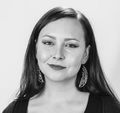|
1. What drew you to start writing poetry? When I was six years old I found an old high school copy of Macbeth that mother hadn’t returned when she dropped out at age 16. We had so few books in the apartment that I was immediately struck by it. When I began to read it I had never experienced language being used in that way (iambic pentameter). Even though I did not understand many of the words I could follow the story (I was transfixed by the image of a king being stabbed with daggers, a mad Queen Macbeth sleepwalking through a Scottish Castle, the three Weird Sisters chanting out their witches’ brew) and the rhythm of the language became inscribed, entrained in me somehow. I found my thoughts assuming the rhythms I had read in Shakespeare and I began to write them down. I suppose a poetic practice evolved from there. 2. Who are your biggest influences? Margaret Christakos, Lisa Robertson, Erin Moure, Ken Babstock, Dionne Brand, Marie Annharte Baker, Karen Solie, Aisha Sasha John, Shannon Maguire, Mat Laporte, Ariana Reines, Ben Lerner, Eileen Myles, Alice Notley, Bernadette Mayer, Gloria Anzaldua, Kathy Acker, Robert Creeley, Charles Olson, Sylvia Plath, Gertrude Stein, Rilke others I am no doubt forgetting. 3. You have a distinctive voice and you pay particular attention to line length, even though length can change dramatically from one poem to the next. Did you consciously develop this style? What prompts your choice of line length in each poem? I like to experiment with line length during the editing process. It is often a cue for me when reading how fast to jump from line to line, whether there will be a breath in between or there will be a breathless cascade of utterance. Sometimes its tied to the content of some poems (my more narrative poems often have short lines to stagger the listener/reader in an attempt to subvert the automatic immersion into story without a more nuances appreciation of language/line compression, etc.). I will decide on line length after trying out differing lengths and then reading each aloud, sometimes recording myself and listening back to confirm which sounds/”works” the “best.” 4. Your poem “Thinktent” harkens to the poets of the Romantic period when Wordsworth, Keats, and others explored themes of science vs. nature. You seem to be of two minds as well, a scientific lab researcher in your “day job” and a poet informed by your Anishnaabe heritage. How do you personally reconcile science, with all its good and bad, versus Nature? Is the world too much with us? I suppose I would say that I do not believe in Nature, the so-called Natural which is apart from and supposedly diametrically opposed in its “goals” in comparison to humans. Humanity and her worlds and fundamentally enmeshed with all other constituent beings in the dynamic ecology which is this known universe. Science is a way of interpreting the world as are the Anishinaabe traditions of reading the land, learning respectfully from plants and animals, and imploring the other-than-human world for guidance. I believe there are many ways that each of us can make sense of our worlds. I trained in Western science and still have a great respect for it but I have also tried to incorporate Anishinaabe views into my thinking and life practice. This is the basis, I think, of my poetics. 5. You mention in an interview with the Globe and Mail that you never thought of becoming a poet per se, and that you literally had an editor call you up with a book offer – every writer’s fantasy. How did it feel then to win the 2016 Griffin Poetry Prize? As if I were simultaneously being pulled up into stratosphere and down into the earth’s molten core.  LIZ HOWARD’s Infinite Citizen of the Shaking Tent won the 2016 Griffin Poetry Prize, the first time the prize has been awarded to a debut collection. It was also a finalist for the 2015 Governor General’s Award for Poetry, was longlisted for the 2015 Type Book Award, and received an honourable mention for the Alanna Bondar Memorial Book Prize. Her chapbook Skullambient (Ferno House, 2011) was shortlisted for the bp Nichol Chapbook Award. Born and raised in northern Ontario, Howard received an Honours Bachelor of Science with High Distinction from the University of Toronto, and an MFA in Creative Writing through the University of Guelph. She now lives in Toronto where she works as a neurocognitive aging research assistant.
0 Comments
Your comment will be posted after it is approved.
Leave a Reply. |
NOWW Writers
Welcome to our NOWW Blog, made up of a collection of stories, reviews and articles written by our NOWW Members. |
Proudly powered by Weebly

 RSS Feed
RSS Feed